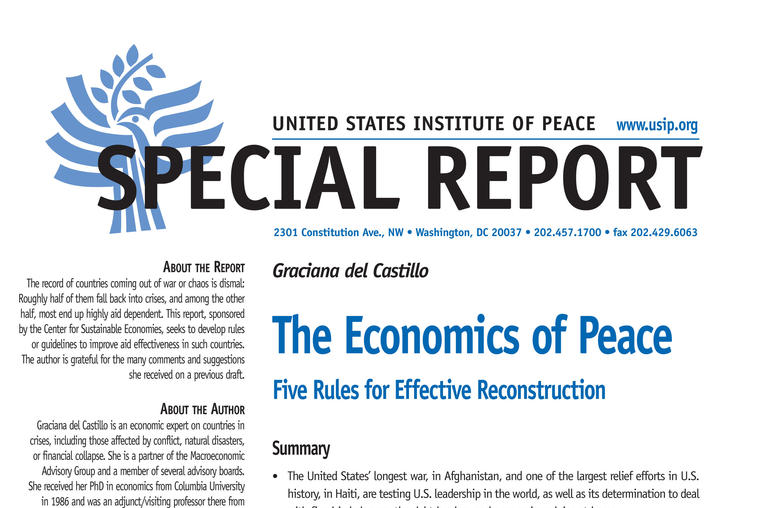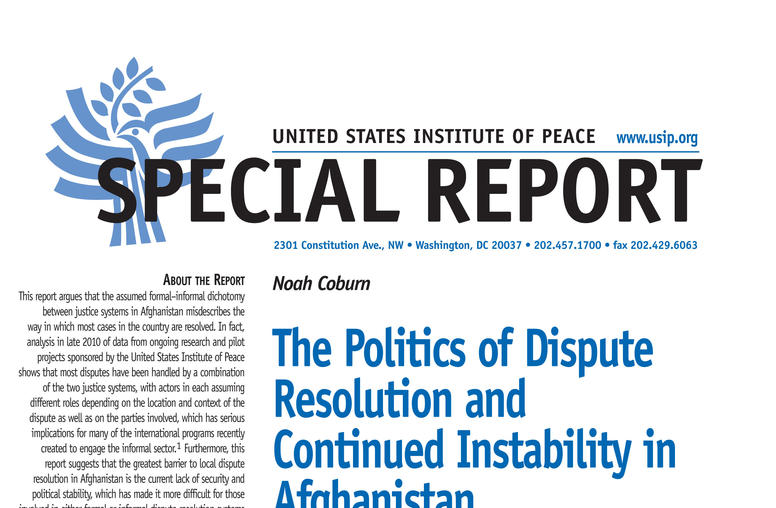Question And Answer
Publications
Articles, publications, books, tools and multimedia features from the U.S. Institute of Peace provide the latest news, analysis, research findings, practitioner guides and reports, all related to the conflict zones and issues that are at the center of the Institute’s work to prevent and reduce violent conflict.

The Economics of Peace
Efforts to rebuild economies in postconflict zones around the world underscore a central lesson: development practices that work in peaceful countries often don’t apply to countries in transition.
USIP Staff Take Cover as Insurgents Mount Brazen Attack in Kabul
USIP’s Sylvana Sinha had just finished lunch and was in the middle of doing some last-minute planning for a rule of law conference the Institute is hosting in Kabul this month when she got word of large blasts downtown.
Panel at USIP Calls for Assessing Media Actions in Conflicts
Although media has become a core part of the international community’s efforts to manage conflict and promote peacebuilding, the ability to evaluate media interventions in conflict lags behind. There is an urgent need to ramp up the monitoring and evaluation of those efforts, a group of specialists said at the United States Institute of Peace (USIP) on September 9.
U.S. Senator on Top Challenges Ahead in Afghanistan
Afghanistan is headed in the right direction, but questions remain about how to sustain the country’s fledgling security forces and how much capacity there is to establish good governance, according to a U.S. senator who recently traveled to the country.
Brimmer Rejects Criticisms of U.N. at USIP Event
Taking on congressional critics of the United Nations, a senior State Department official told an audience at the United States Institute of Peace (USIP) on September 7 that the Obama administration’s multilateral diplomacy at the U.N. has bolstered U.S. security but that “backwards” calls to cut or further restrict U.S. funding for the world body, if enacted, would harm U.S. global influence.
Senior Official to Discuss U.N. Policies at USIP
The need for collaborative, multilateral action at the United Nations and on global problems is growing, but so are the budgetary pressures on the U.S. government’s foreign affairs spending. That collision of factors provides the context for a scene-setting address at the United States Institute of Peace (USIP) by Esther Brimmer, the assistant secretary of State for International Organization Affairs.
Dispute Resolution and Durable Peace in Afghanistan
USIP’s Scott Worden discusses the connection between local dispute resolution work, U.S. national security objectives and a lasting peace in Afghanistan.
Getting to ‘Afghan Good Enough’
With the Obama administration poised to transition the bulk of its forces out of Afghanistan by 2014, it’s all the more critical to build credible, accountable and enduring institutions there.
Five Myths of Afghan Reconciliation
Amid the budding political discourse on a peace process in Afghanistan, USIP’s Gordon Lubold examines five myths about reconciliation.

The Politics of Dispute Resolution and Continued Instability in Afghanistan
In this Special Report Noah Coburn analyzes findings from USIP's in-country research projects on dispute resolution in Afghanistan. The report argues that the lines between formal and informal justice systems in Afghanistan are blurred and that this has major implications for international programs engaging the informal sector, and ultimately concludes that lack of security and political stablity are the greatest challenges to dispute resolution.